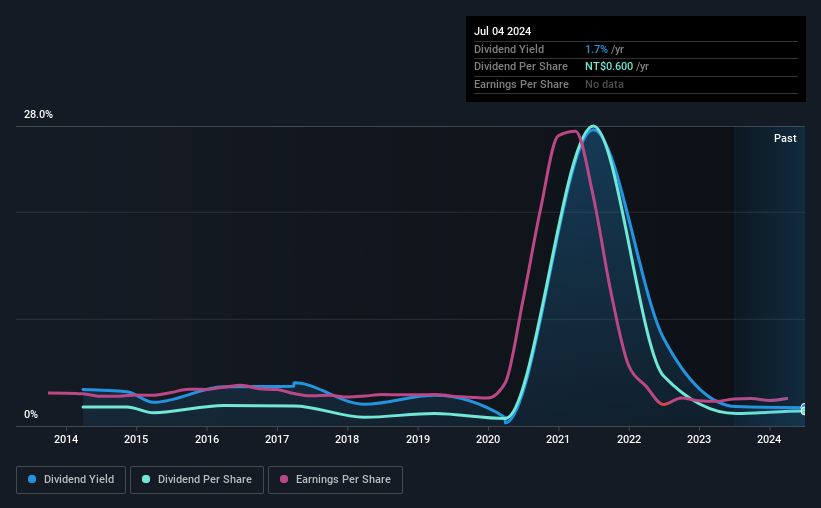Stock Analysis
Don't Race Out To Buy Universal Incorporation (TWSE:1325) Just Because It's Going Ex-Dividend

Some investors rely on dividends for growing their wealth, and if you're one of those dividend sleuths, you might be intrigued to know that Universal Incorporation (TWSE:1325) is about to go ex-dividend in just four days. The ex-dividend date occurs one day before the record date which is the day on which shareholders need to be on the company's books in order to receive a dividend. The ex-dividend date is important because any transaction on a stock needs to have been settled before the record date in order to be eligible for a dividend. Thus, you can purchase Universal Incorporation's shares before the 10th of July in order to receive the dividend, which the company will pay on the 6th of August.
The company's upcoming dividend is NT$0.60 a share, following on from the last 12 months, when the company distributed a total of NT$0.60 per share to shareholders. Calculating the last year's worth of payments shows that Universal Incorporation has a trailing yield of 1.7% on the current share price of NT$34.45. Dividends are a major contributor to investment returns for long term holders, but only if the dividend continues to be paid. As a result, readers should always check whether Universal Incorporation has been able to grow its dividends, or if the dividend might be cut.
See our latest analysis for Universal Incorporation
Dividends are typically paid from company earnings. If a company pays more in dividends than it earned in profit, then the dividend could be unsustainable. Universal Incorporation distributed an unsustainably high 157% of its profit as dividends to shareholders last year. Without extenuating circumstances, we'd consider the dividend at risk of a cut. Yet cash flows are even more important than profits for assessing a dividend, so we need to see if the company generated enough cash to pay its distribution. Dividends consumed 53% of the company's free cash flow last year, which is within a normal range for most dividend-paying organisations.
It's good to see that while Universal Incorporation's dividends were not covered by profits, at least they are affordable from a cash perspective. If executives were to continue paying more in dividends than the company reported in profits, we'd view this as a warning sign. Extraordinarily few companies are capable of persistently paying a dividend that is greater than their profits.
Click here to see how much of its profit Universal Incorporation paid out over the last 12 months.

Have Earnings And Dividends Been Growing?
Businesses with shrinking earnings are tricky from a dividend perspective. Investors love dividends, so if earnings fall and the dividend is reduced, expect a stock to be sold off heavily at the same time. With that in mind, we're discomforted by Universal Incorporation's 11% per annum decline in earnings in the past five years. Such a sharp decline casts doubt on the future sustainability of the dividend.
Many investors will assess a company's dividend performance by evaluating how much the dividend payments have changed over time. Universal Incorporation's dividend payments per share have declined at 2.4% per year on average over the past 10 years, which is uninspiring. It's never nice to see earnings and dividends falling, but at least management has cut the dividend rather than potentially risk the company's health in an attempt to maintain it.
The Bottom Line
Has Universal Incorporation got what it takes to maintain its dividend payments? It's never fun to see a company's earnings per share in retreat. What's more, Universal Incorporation is paying out a majority of its earnings and over half its free cash flow. It's hard to say if the business has the financial resources and time to turn things around without cutting the dividend. Overall it doesn't look like the most suitable dividend stock for a long-term buy and hold investor.
With that in mind though, if the poor dividend characteristics of Universal Incorporation don't faze you, it's worth being mindful of the risks involved with this business. To that end, you should learn about the 3 warning signs we've spotted with Universal Incorporation (including 1 which is significant).
Generally, we wouldn't recommend just buying the first dividend stock you see. Here's a curated list of interesting stocks that are strong dividend payers.
Valuation is complex, but we're helping make it simple.
Find out whether Universal Incorporation is potentially over or undervalued by checking out our comprehensive analysis, which includes fair value estimates, risks and warnings, dividends, insider transactions and financial health.
View the Free AnalysisHave feedback on this article? Concerned about the content? Get in touch with us directly. Alternatively, email editorial-team (at) simplywallst.com.
This article by Simply Wall St is general in nature. We provide commentary based on historical data and analyst forecasts only using an unbiased methodology and our articles are not intended to be financial advice. It does not constitute a recommendation to buy or sell any stock, and does not take account of your objectives, or your financial situation. We aim to bring you long-term focused analysis driven by fundamental data. Note that our analysis may not factor in the latest price-sensitive company announcements or qualitative material. Simply Wall St has no position in any stocks mentioned.
Valuation is complex, but we're helping make it simple.
Find out whether Universal Incorporation is potentially over or undervalued by checking out our comprehensive analysis, which includes fair value estimates, risks and warnings, dividends, insider transactions and financial health.
View the Free AnalysisHave feedback on this article? Concerned about the content? Get in touch with us directly. Alternatively, email editorial-team@simplywallst.com
About TWSE:1325
Universal Incorporation
Manufactures and sells nonwoven fabrics in the United States, Asia, and Europe.
Flawless balance sheet with proven track record.

